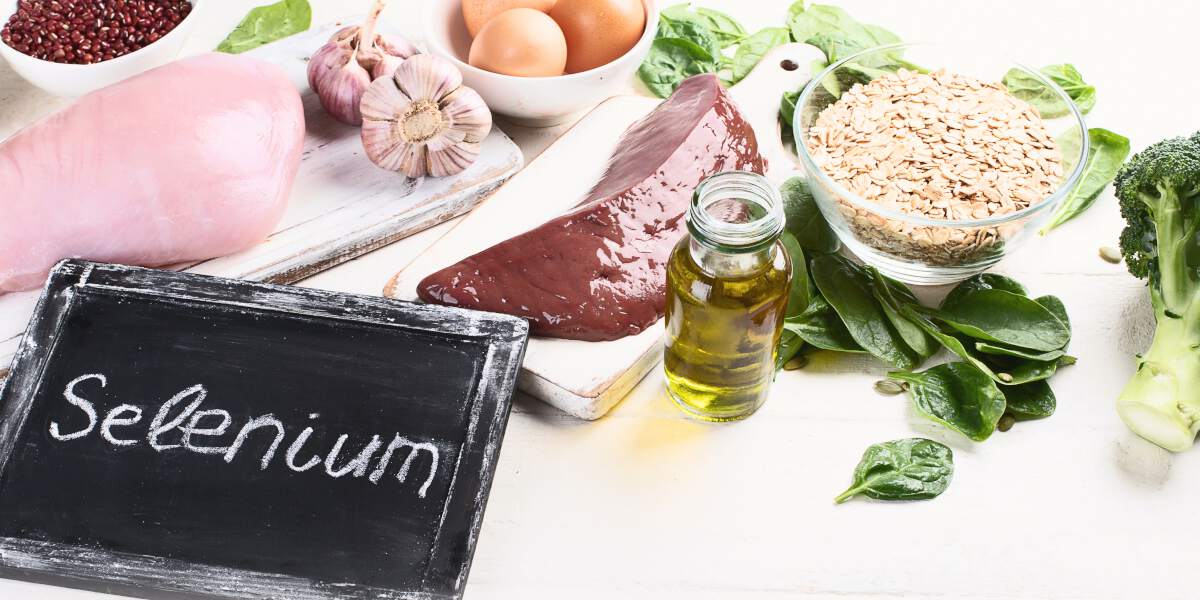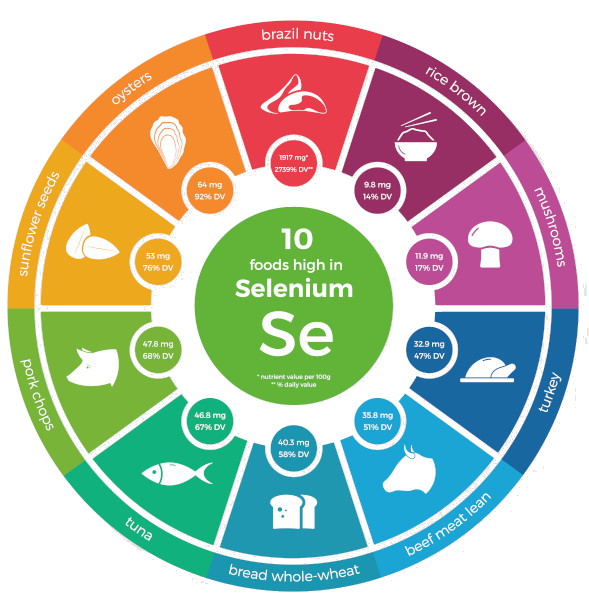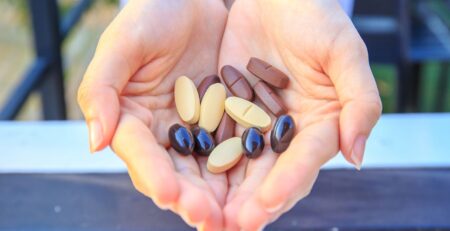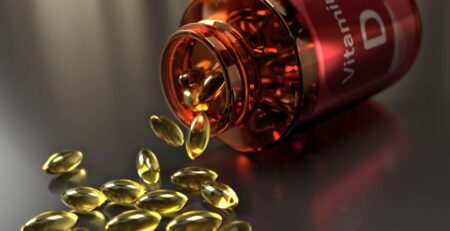What Health Benefits Does Selenium Provide?
Why do we use selenium in our vitamin packets?
A better question than why we use selenium in our vitamin formulations would be why wouldn’t we use an essential mineral that promotes exceptional health benefits. Read on to understand this nutrient’s crucial role in helping the body perform.
Selenium is known as a trace mineral. Unlike the major minerals — calcium, phosphorus, potassium, sodium, sulfur, and magnesium — trace elements are essential in small amounts and should not be taken in large doses.
Selenium exists in two forms: inorganic (selenate and selenite) and organic (selenomethionine and selenocysteine).
Dietary selenium can be found in the plant- and animal-based foods, making adequate nutritional intake relatively easy to achieve. It is known to improve brain health, the immune system, the thyroid, and fertility.
Selenium deficiency has been correlated in studies with an increased risk of health problems, including chronic inflammation, infertility, poor immune function, and cognitive decline.
What food sources is selenium found in?
In addition to our vitamin and dietary supplements, there are several natural sources of selenium.
The amount of selenium in plant-based foods varies depending on the selenium content of the soil in which they were grown. Once ingested, selenium is mostly stored in the skeletal muscles. Rain, vaporization, pesticides, and pH levels all affect selenium levels in plants.
The recommended daily amount (RDA) of selenium for an adult is 55 micrograms (mcg). Here is a partial list of foods high in selenium:
- Brazil nuts have 544 mcg per ounce (about six to eight nuts).
- Yellowtail fish has about 92 mcg of selenium for three ounces. Sardines, oysters, clams, halibut shrimp, salmon, and crab have between 40 and 65 mcg.
- Ham has about 42 mcg per three servings.
- Fortified foods such as pasta, whole wheat bread, and whole grain cereals are enriched with 40 mcg of selenium per cup.
- Three ounces of pork contain 33 mcg of selenium.
- Turkey has 31 mcg of selenium.
- One hard-boiled egg has 20 mcg of selenium.
What are the health benefits of selenium?
Though scientists are still exploring the myriad of ways selenium helps the body work well, its antioxidant properties are well accepted.
Does selenium improve heart health?
Studies generally agree that people deficient in selenium are more prone to cardiovascular disease. Selenoproteins may reduce heart inflammation and the enzyme glutathione peroxidase — a selenoprotein — prevents oxidative damage of lipids (body fats) and the buildup of platelets.
Lipid oxidation is a highly complex reaction between fatty acids and oxygen. When this happens, the free radicals created by oxidation can interact with proteins and sugars in foods and negatively modify their nutritional value.
Does antioxidant activity maintain brain activity?
Low selenium levels can increase the risk of cognitive decline. Its importance in the health and aging process has been documented. Studies in cognitive decline suggest that optimal selenium status is important to maintaining neuropsychological functions in aging people.
Several studies have shown that patients with Alzheimer’s disease have lower blood levels of selenium.
Selenium is a powerful antioxidant that can slow down cell damage caused by free radicals. Sometimes called “radical scavengers,” free radicals are unstable molecules produced. as the body metabolizes food and reacts to the environment.
Without antioxidants, free radicals can damage cells and contribute to cognitive decline.
Want a healthy thyroid?
Selenium plays a critical role in metabolism and thyroid function and helps protect the body from damage caused by oxidative stress.
The thyroid is a butterfly-shaped gland in front of the neck that makes hormones that help control every organ. When your thyroid hormone levels are too high or too low, your body can’t work right. That can affect your energy level, mood, and weight.
In adults, the thyroid gland has the highest amount of selenium per gram of tissue. In the thyroid, selenium is required for antioxidant function and the metabolism of thyroid hormones. These hormones regulate body temperature, heart rate, and metabolism.
Selenium supplements for people with autoimmune inflamed thyroid disease (such as Hashimoto thyroiditis and hypothyroidism) are associated with a reduction in antibody levels. In some cases, antibodies attack the body’s cells, tissues, and organs. This reaction is called an autoimmune response.
Avoiding selenium deficiency is an excellent way to prevent thyroid disease and preserve overall health.
How does selenium prevent heart disease?
Selenium may help keep your heart healthy by keeping oxidative stress in check and reducing your risk of heart disease. Studies generally agree that people deficient in selenium are more prone to cardiovascular disease. Selenoproteins may reduce heart inflammation and the enzyme glutathione peroxidase — a selenoprotein — prevents oxidative damage of lipids (body fats) and the buildup of platelets.
Lipid oxidation is a highly complex reaction between fatty acids and oxygen. When this happens, the free radicals created by oxidation can interact with proteins and sugars in foods and negatively modify their nutritional value.
Studies show that low selenium levels are linked to an increased risk for heart disease. Therefore, taking selenium supplements can reduce your risk. Indeed, a 50% increase in selenium concentration can mean a 24% reduction in the risk of heart disease.
Selenium also lowers inflammation— a prime risk factor for heart disease and plaque buildup in the arteries.
Does your immune system require selenium?
Both selenium and vitamin C (also in our formulations) play an important role in the proper functioning of the immune system. Insufficient levels of selenium may tamp down the immune system. For patients with HIV, influenza, tuberculosis, hepatitis C, or those undergoing dialysis, selenium supplements lead to fewer hospitalizations and improved symptoms.

Does selenium reduce asthma symptoms?
The anti-inflammatory effects of selenium may reduce the impact of asthma.
Observational studies indicate that by lowering inflammation, selenium may benefit people suffering from asthma. It has been shown that patients with chronic asthma often have low levels of selenium.
Another recent study found that higher blood levels of selenium lead to better lung function—just 200 mcg of selenium reduced people’s reliance on medicine to control asthma symptoms.
Other selenium benefits
A meta-analysis found that people also use selenium to reduce high blood pressure during pregnancy, prostate cancer, cancer prevention, complications from statin drugs, abnormal cholesterol, and cataracts.
What are potential selenium side effects?
Because there can be rare potential side effects from selenium toxicity, VitaminMD pays extra attention to the amount of selenium. Never take more of our vitamins than directed.
Contact your healthcare provider if you notice the following symptoms:
- Diarrhea
- Weakened fingernails
- Garlic odor from breather or sweat
- Hair loss
- Irritability
- Itching
- Nausea and vomiting
- Unusual fatigue
- Kidney failure
If you are pregnant or breastfeeding, please consult your doctor before any intake of selenium.
While selenium can decrease cancer risk, too much selenium can increase the risk of some types of cancer.
Why trust VitaminMD with your vitamin formulations?
The VitaminMD Story
Dr. David Nazarian developed VitaminMD as a result of the COVID-19 pandemic. He saw his patients’ diets lacked an all-inclusive vitamin — an essential immunity boost that optimizes overall health. He also noticed that most of his patients were vitamin D deficient and unaware of its many problems.
Many patients asked Dr. Nazarian what to take to boost their immune systems and keep their bodies strong against infections, but there wasn’t one product with all the necessary ingredients.
About VitaminMD
There is a wide variety of multivitamins available to the public. Unfortunately, no single multivitamin has been specifically formulated to meet today’s needs. VitaminMD’s custom vitamin packets and formulas contain many ingredients that patients can’t find in a single product. Our vitamin supplements are easy to drink, great tasting, and absorb better than tablets. VitaminMD was formulated by an M.D. on the pandemic frontlines with the specific purpose of meeting today’s health needs.
Many patients do not like to take multiple tablets (11% of the U.S. population). A VitaminMD elixir or vitamin drink delivers a powerful and comprehensive dose of all the necessary vitamins that boost the immune system and support overall health. Other vitamins often lack main ingredients — meaning patients must take multiple tablets to meet all their needs. VitaminMD’s daily vitamin packets can easily be added to water to drink as a multivitamin daily.
Many people are deficient in vitamin D and popular immunity drinks on the market today lack enough vitamin D. VitaminMD has the necessary dosage of vitamin D and other great ingredients that boost immunity and optimize overall health.
The content on this web page provides information that should not take the place of medical advice.
Sources:
Medical News Today https://www.medicalnewstoday.com/articles/287842
Food Minerals org. https://foodminerals.org/trace-minerals/
Healthline https://www.healthline.com/health/selenium-foods https://www.healthline.com/nutrition/selenium-benefits#3.-May-protect-against-heart-disease
National Library of Medicine https://pubmed.ncbi.nlm.nih.gov/22419540/













Leave a Reply